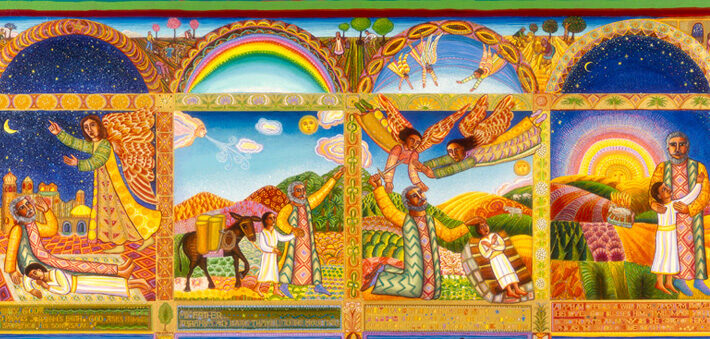Commentary on Matthew 10:40-42
Jesus’ discourse on the disciples’ mission to the “lost sheep of the house of Israel” (10:6) alternates between images of warning and promise.
The disciples are granted remarkable powers, even to raise the dead (10:1, 8), but are warned repeatedly of the suffering and threats they will face (e.g., 10:16-18, 21-23, 34-36). Their closest and most important relationships will be ruptured (10:21, 34-39), and yet they participate in the most integral of relationships not only with Jesus, but with God.
On the face of it, these seemingly contradictory conditions may sound like a crude way of motivating the disciples to face harsh realities: “you will suffer now, but your eschatological reward will be great.” Warning and promise are here, however, not two, mutually exclusive points in a temporal series — risk now, reward later — but rather the two poles that together define the singular experience of discipleship. To be sure, the last three verses of this discourse (10:40-42) serve as a counterpoint to the notice of broken relationships in the preceding section (34-39).
Yet, even within these verses, Jesus’ promises of reward also carry reminders that the vocation of the disciples is dangerous. They are numbered among the prophets and the righteous, whose fate Matthew persistently associates with opposition, suffering, and death (cf. 5:11-12, 23:29-36). They are also counted among the most vulnerable members of the community, the “little ones” for whom a cup of cold water is a gift.
In the preceding verses of this sermon, Jesus focuses on the rupture of the disciples’ most important relationships as they take up the cross and follow Jesus (10:34-38). Now, these final verses in the sermon affirm first the relationships between disciples, Jesus, and God (10:40) and then the certainty of the reward due to those who welcome prophets, the righteous, and the little ones (41-42).
The first of these triads presupposes Jewish traditions in which emissaries represent the functional presence and bear the full authority of the one who sends them (cf. 10:1, 8; 28:18-20). The disciples represent the full presence and power of Jesus, just as Jesus bears the full presence and power of God, as Matthew stresses throughout the Gospel. While emissary relations might imply a hierarchy of power, Jesus is here instead affirming the full, real, integral, and authoritative relationship between the disciples, Jesus, and God.
More than any other Gospel, Matthew underlines the ways in which Jesus not only represents divine power and presence, but democratizes this power — and the responsibilities that come with it — in ministry with his disciples (e.g., 9:1-8; 10:1, 8; 14:22-33; and 28:18-20). This discourse as a whole makes clear that God’s power is now at work not only in Jesus, but in and through his disciples.
The integral relationships between the disciples, Jesus, and God replace the disciples’ broken relationships with family and society, a point to which Matthew will return in 12:46-50 and 13:53-58. Apparently, the call of discipleship does not fit very happily with “traditional family values,” whether ancient or modern. The vocation of disciples necessarily relativizes all other relations and obligations — whether to party, corporation, or family — in favor of the new family that is the community of disciples.
The second triad of relationships — prophets, the righteous, and “little ones” — also might imply a hierarchy within the community, for prophets and the righteous seem much more important than “little ones,” who elsewhere include the most vulnerable members of the community (18:1-14). Triads often focus attention on the third member, whose identity comes as a surprise. Thus, audiences might have expected this triad to include prophets, the righteous, and … the wise or the holy ones.
The identification of the little ones, in need of a cup of cold water, instead elevates the least powerful member of the community of disciples into a position equal in importance to that of prophets and righteous ones. At the beginning of this discourse, Jesus sends his disciples in mission without any means of support or defense — no gold or money, no bag, no change of clothes, not even a staff or sandals. They are completely dependent, first on God and then on the hospitality of the communities that receive them. Their vulnerability and dependence is the key to the success of the mission.
These three designations — prophets, the righteous, and little ones — do not differentiate members of the community so much as they describe interrelated aspects of Christ-discipleship. The prophetic dimension has to do with proclamation and miraculous demonstrations of divine power. Righteousness is the enduring pursuit of justice and of the healing and restoration of relationships. The vulnerability of little ones demonstrates that the mission is wholly dependent on God’s power and presence. The power at work in this mission is fundamentally different in kind from other forms of human power. Dependence is contrary to American cultural values, but dependence on God is crucial to the integrity and distinctive character of the alternative community Jesus is building.
The theme that binds these two triads of relationship into a unit is “welcoming,” which is at the heart of every relationship in these verses. Jesus is not merely pointing in a general way to the importance of welcoming or hospitality, already an important value among the communities in which he ministered.
He draws attention, rather, to the specificity of 1) welcoming prophets as prophets, who expect opposition and violence at the hands of the powers; 5:11-12, 23:29-36); 2) welcoming the righteous as those who work for justice, usually risking their lives to do so; and 3) offering a cup of cold water to the little ones “in the name of a disciple” (10:42). These acts of welcoming come at a cost that surpasses food, water, and shelter. They bind those who offer welcome integrally with those who are welcomed. These acts are not “one off” events, but constitute the defining feature of the mission, generating the social settings where God’s way is articulated, discerned, and either accepted or rejected.


June 29, 2014